Interviews with experts and opinion leaders from our research network
On the occasion of the 50th anniversary of the establishment of the Hitachi Research Institute (hereafter referred to as HRI), we have invited Mr. Takashi Kawamura, Chairman Emeritus of Hitachi, Ltd., to speak about the role that HRI should play going forward. HRI was established in 1973 at the initiative of Kenichiro Komai, then chairman of Hitachi, Ltd., with the aim of “establishing a soft science that integrates economy, society, management, technology, and other fields.” Its establishment prospectus states that HRI shall “respond to the long-term and fundamental issues of the Hitachi Group as well as the resolution of global social issues,” and “develop human resources who are able to devise a cross-cutting total system unifying the human capital of the Hitachi Group.” Given the increasing importance of pursuing these ideals, we will delve into what kind of thinking and awareness should be taken in order to achieve the “sustainable society” and “global growth” that Hitachi is aiming for. (Interviewer: Norihiro Suzuki, Chairman of Hitachi Research Institute)
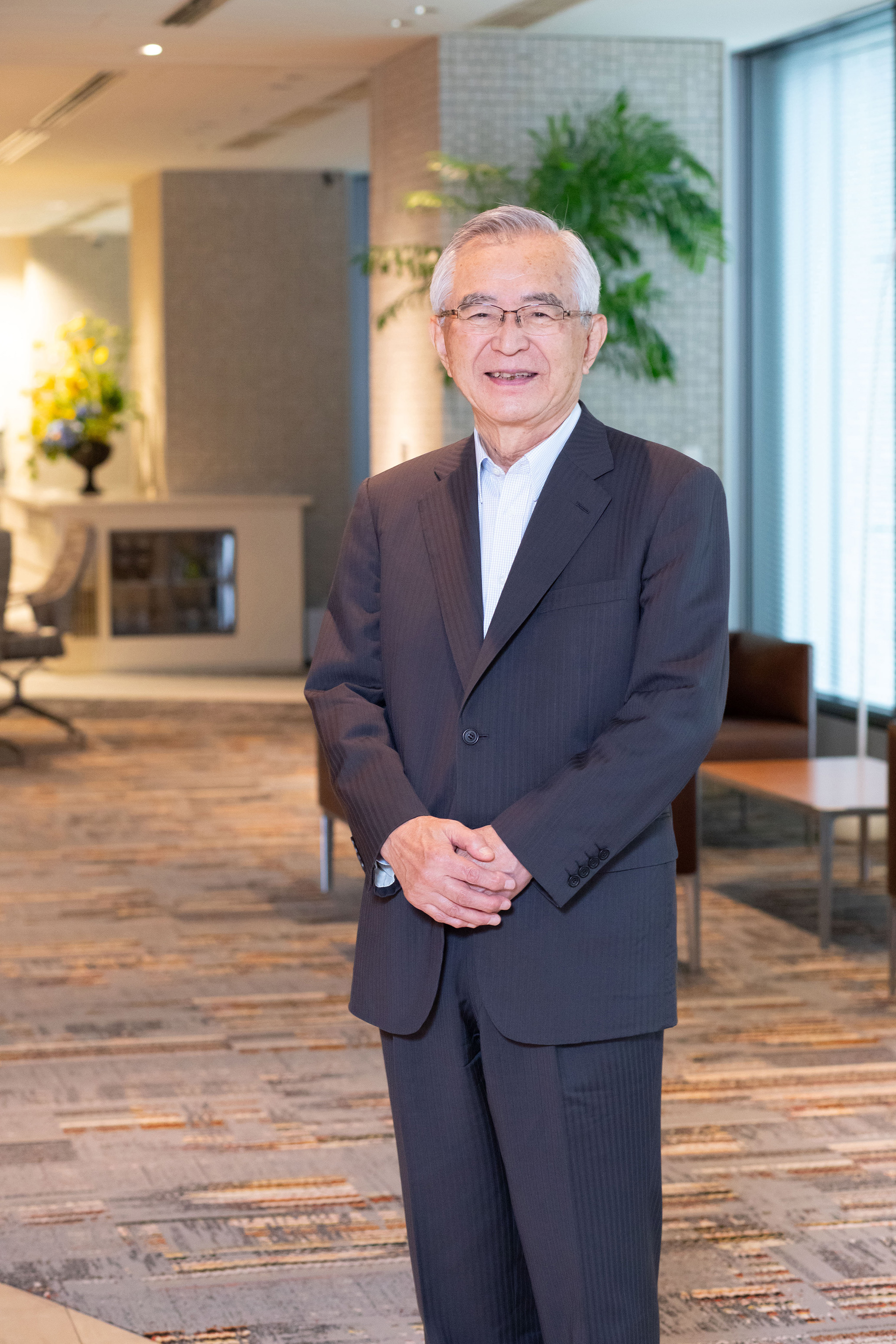
Chairman Emeritus of Hitachi, Ltd. (former Chairman of Hitachi, Ltd., former Chairman of the Board of Directors of Tokyo Electric Power Company Holdings, Inc.)
Born in Hokkaido in 1939.
Joined Hitachi, Ltd. after graduating from the Department of Electrical Engineering, Faculty of Engineering, the University of Tokyo in 1962. After serving as Division Manager of Thermal Power Engineering Division, Power Group and General Manager of Hitachi Works, he became an Executive Vice President in 1999. After that, he successively served as Chairman of group companies such as Hitachi Maxell. In 2009, after Hitachi posted a huge final deficit of 787.3 billion yen, he was appointed Chairman and President and spearheaded the revitalization of the company. The following year in 2010, after the company established a path to profitability, he retired from the position of President, and from Chairman in 2014.
He was President of the Institute of Electrical Engineers of Japan from 2004 to 2005, Vice-president of Japan Business Federation from 2010 to 2014, Outside Director of Mizuho Financial Group, Inc. from 2014 to 2019, Outside Director of Calbee, Inc. from 2015 to 2017, Outside Director of Nitori Holdings Co., Ltd. from 2016 to 2017, and Chairman of the Board of Directors of Tokyo Electric Power Company Holdings, Inc. from 2017 to 2020. He was Chairman of Hitachi Research Institute from 2013 to 2015.
He has authored books including “The Last Man” (Kadokawa), “Reforming a 100-year-old Company: Hitachi and I” (Nikkei Business Publications), and “Ichi Zoku Roku Sen” (Toyo Keizai).
Suzuki:You served as Chairman of HRI from 2013 to 2015. As a think tank of the Hitachi Group, HRI is committed to “seeking out the truth” in research. Could you share with us your opinion on the role that HRI is expected to play amidst an increasingly uncertain global social situation and business environment? In particular, I would like you to tell us what has changed since you were in office as Chairman, and how HRI should position itself in the future.
Kawamura:The Hitachi Group is undergoing an unprecedented rapid transformation of its business structure. Of course, we have been implementing business structural reforms for a long time now, but the shift from products to digital is progressing rapidly, and I feel that the accompanying structural reforms are very volatile. I currently serve as the President of the Hitachi Shayu Club, a gathering of Hitachi alumni. As Hitachi’s products business is increasingly being overshadowed, our seniors are apprehensive whether the company will really be able to pull this transformation through. But I do not completely share their apprehensions. This is because I believe that we are in a period of great transformation comparable to the First Industrial Revolution.
Looking back at the history of civilization, we can see that the First Industrial Revolution enabled the development of various industries by replacing manual labor with machines. The steam engine, invented by James Watt, triggered the development of railroads, ships, cars and airplanes, enlarged the scale of factory equipment, and led to the replacement of mechanical and physical mechanisms with electricity, greatly expanding what can be done with human hands and feet. Thinking about cars as one of the examples, we know that a car that runs at 50 kW would require about 70 horsepower, or equivalent to 70 horses. Clearly, it is impossible for one person to move something that requires the power of 70 horses without using a machine. During the First Industrial Revolution, it can be said that people were all moving in that same direction at the same time, on the premise that making life easier for people by replacing and supporting manual labor with machines would lead to happiness. Indeed, it was a very important step for mankind.
During my active work years, I experienced the final chapter of mechanization, and the substitution of and support industries for manual labor were already in a saturated state. Of course, machinery, equipment, and infrastructure will eventually become obsolete, so industries that meet the demand for their replacement will remain. However, humans need to think about the next development. I believe that new industries and civilizations in the future must shift to supporting intellectual labor rather than focus on replacing and supporting manual labor as before.
The human brain is more sophisticated and complex than we think it is, and it cannot be easily replaced by machines. To begin with, computers cannot create problems on their own. So, if you ask a computer, “What will happen to the world in the future?” it will not be able to give a proper answer. But computers are making steady progress, now by using them, we can develop AI, apply them to robots, build digital twins for simulations, and fabricate products from data using 3D printers. We have thus been able to quickly feed customer voices back to our products. It can be said that Google, Amazon, Facebook, Apple, and Microsoft (GAFAM) have been at the forefront of significantly expanding business in terms of utilizing AI for individuals. Amazon has grown significantly by collecting and analyzing purchasing data from people around the world and making recommendations by predicting customer preferences. The industrial revolution ushered in by intellectual labor support for corporations is finally coming into full swing. I believe that the role of the Hitachi Group henceforth will also be to support intellectual labor and its widespread adoption in society.
I think that the major theme that HRI should address is how Hitachi can respond to such rapid changes in industry and civilization. Likewise, we should figure out the kind of business portfolio, including our products, we should pursue. In the future, with the reduction in product demand and the further expansion of digital technology in society as a whole, HRI should think about how much products will remain in the world, and what the Hitachi Group should do to survive in such a world.
Suzuki:As you say, HRI should take the lead in analyzing and discerning the risks and opportunities and in shaping the directions of the Hitachi Group's business with a firm grasp of the changes in the economy, society, management, and technology that affect our business. On the basis of this function, which we call the “business intelligence function,” we will support the planning and execution of medium- to long-term business strategies of the Hitachi Group.
Suzuki:In the age of VUCA*, where the future is difficult to foresee, what kind of organizational capabilities do you think are necessary to carry out this business intelligence function?
Kawamura:The widening of disparities is a difficult problem that companies deal with as digitalization progresses. Since digital products and services can be copied easily, subsequent products are cheaper than those that were first introduced to the market. Therefore, although the founders and top executives of companies that created the first excellent products will make good profit, the followers that come in later, especially mid-sized and smaller companies, will make little profit. If this occurs throughout society, something similar to the “Trump phenomenon” will occur. Former President Donald Trump garnered a great deal of support from the middle class, who were dissatisfied with the disparities that have arisen in this kind of social structure. Members of the middle class who were at the frontlines of factories of companies like GM and Ford increased their income as they grew older, enabling them to live more stable lives. However, as digitalization progressed, wealth began to concentrate primarily in the upper echelons of society. I think it will be difficult to achieve a sustainable society unless this structure is corrected.
However, correcting disparity is a colossal problem that is difficult to deal with. HRI should collaborate with various organizations to solve this problem, and also make academic and political recommendations as necessary.
Suzuki:What specific solutions can you think of to correct this disparity?
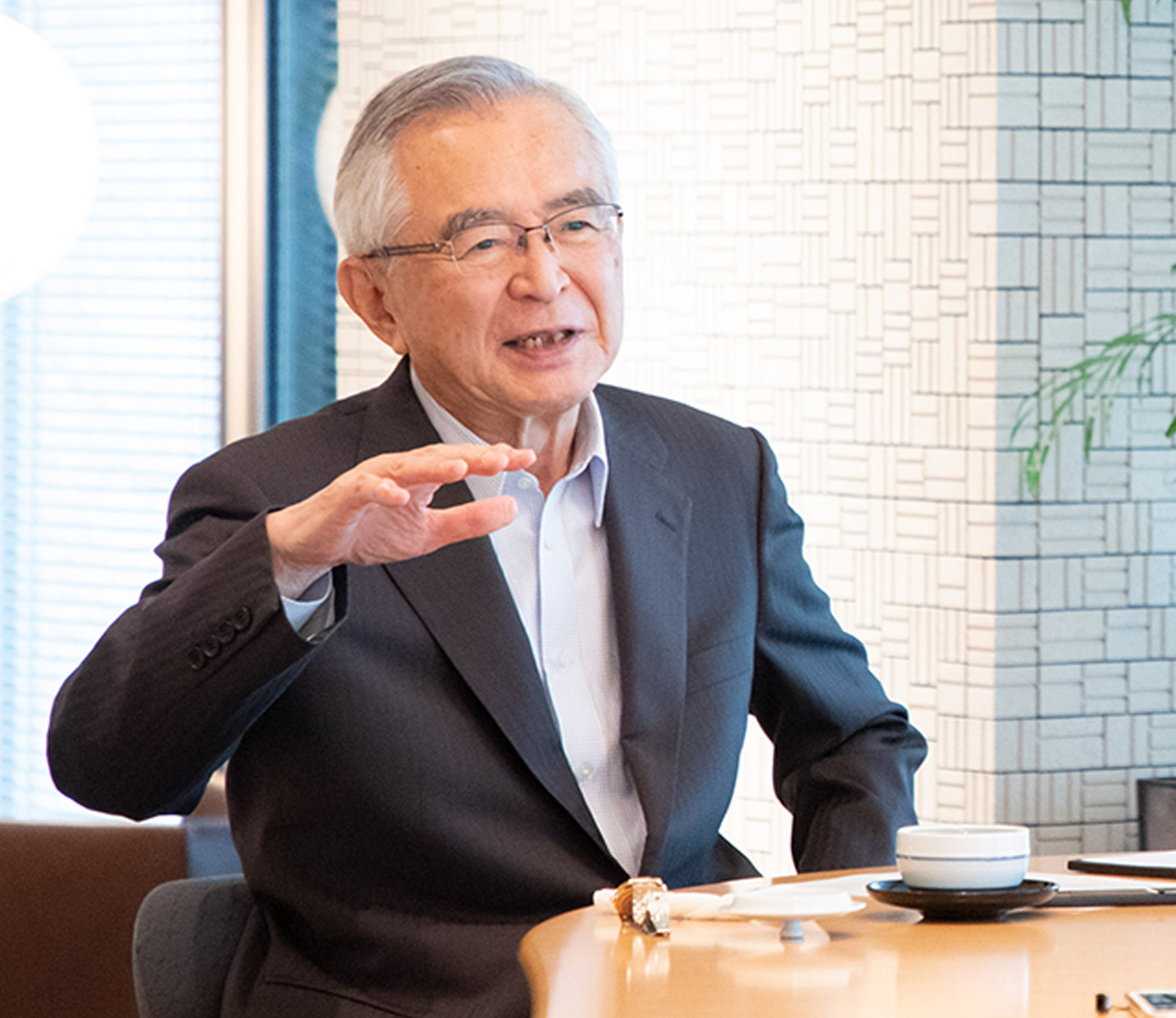
Kawamura:An example would be the introduction of a negative income tax system that will pay a benefit to households with an annual income lower than a standard value. Assuming a $30,000 annual income threshold and a tax rate of 40%, if your annual income is $20,000, the negative portion of $10,000 from the threshold is considered as your negative income. At a 40% tax rate, you will therefore receive $ 4,000. If you have no income, you will receive $12,000, which is 40% of the $30,000 negative income. I think we should consider this kind of easy-to-understand mechanism to prevent the further widening of disparities.
On the other hand, these efforts must not remain as mere relief projects for the poor. We must not dampen the ambitious motivation of entrepreneurs, i.e., the “animal spirit” as coined by economist John Maynard Keynes. It is important to close the gap while properly maintaining a system in which people who have worked hard and sweated it out can reasonably earn based on how much they worked.
I think this is a very large-scale and complicated issue. As such, it may not be enough to remedy disparities by simply reforming the tax system. Some kind of major reform is necessary, either through the adoption of a new social framework, a new thought or philosophy. For example, Japan experienced serious pollution from the 1960s to the 1970s, which led to the establishment of pollution regulations, which in turn led to the development of energy conservation and green businesses. I think this kind of major shift in consciousness is necessary.
In any case, companies must create added value, generate profits, and give back to society. I believe that it will be important to establish a new civilization and implement values in society while using a part of those profits to correct disparities, as the axis of corporate activities in the future. I think HRI could have a huge part to play in figuring out how to return profits to society and realize the correction of disparities and in making policy recommendations in cooperation with various organizations.
Suzuki:HRI must firmly tackle the issues, suggest solutions, and make recommendations to address the disparities arising from digitalization. Ultimately, what matters most is to bring these solutions and recommendations to actual social implementation. Otherwise, we will not be able to continue our corporate activities in the future. Indeed, HRI should work on the essential issue.
Kawamura:Generative AI will accelerate the support for intellectual labor in the future. When this happens, there will always be people who will be left behind, so I hope that HRI will come up with solutions to prevent that from happening.
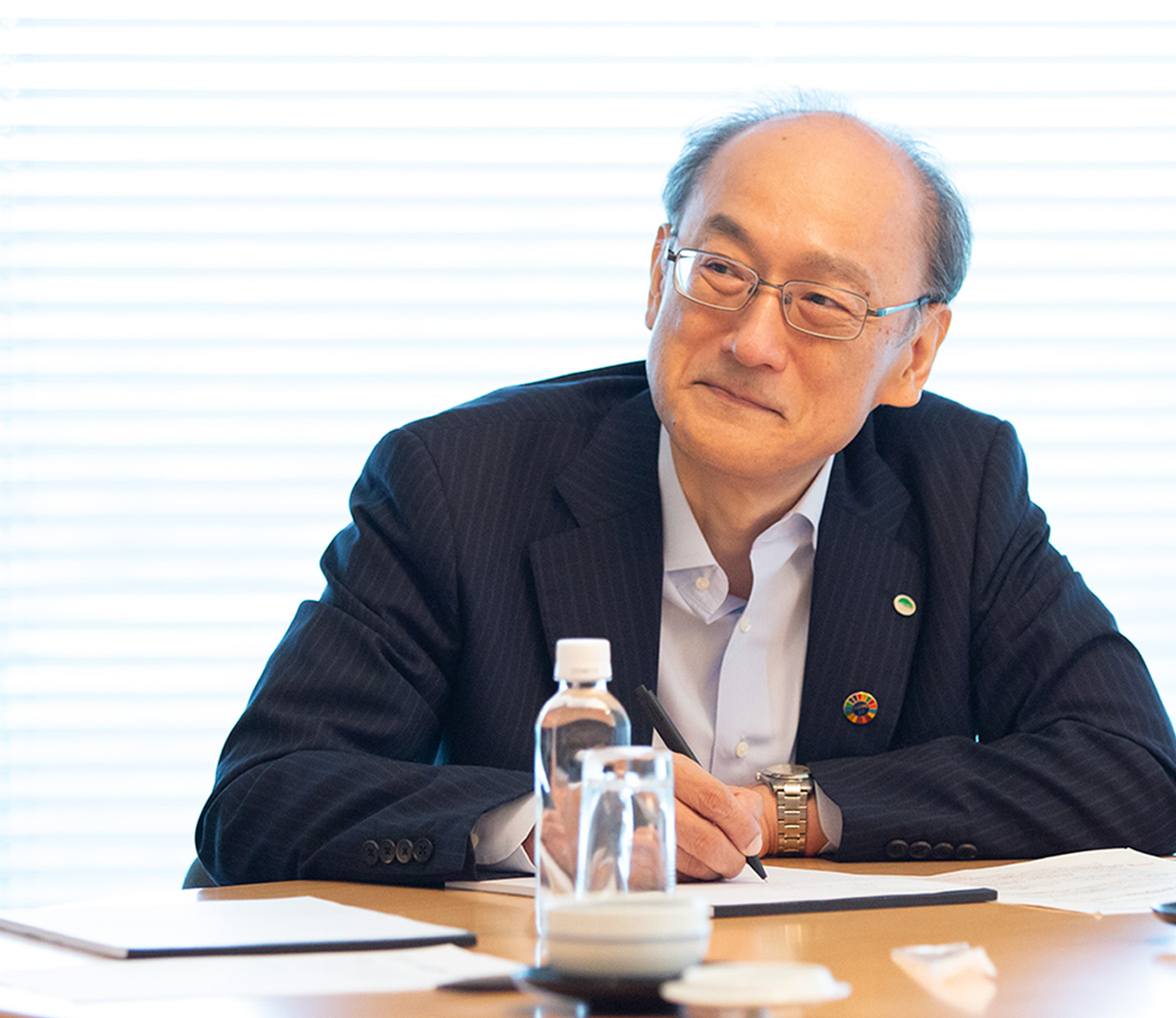
Suzuki:At the G7 Summit in Hiroshima in May 2023, all leaders shared the view that there are “diverse pathways” towards the reduction of carbon dioxide emissions. Development of technologies to achieve carbon negativity is also underway. On the other hand, developing countries have demanded increased financial assistance from developed countries at the United Nations Framework Convention on Climate Change Conference of the Parties (COP). This conflict between developed and developing countries in efforts to achieve carbon neutrality is likely to continue in the future. In light of these circumstances, what do you think should be the path to pursue to achieve carbon neutrality?
Kawamura:As a developed country, I believe that Japan should take the lead in contributing to the realization of carbon neutrality. Japan's foreign exchange reserves are second only to China, so that it has ample supply of foreign currency. Therefore, it should take the lead in providing financial assistance as a developed country. Also, among developed countries, Japan has a relatively low total amount of carbon dioxide emitted in the past. That is why Japan can take the initiative for dealing with carbon. This problem entails more than simply making a social contribution but has already become an international political struggle over carbon.
In addition, the use of technologies such as Direct Air Capture (DAC), which directly captures CO2 from the atmosphere, and Carbon dioxide Capture and Storage (CCS), which stores CO2 underground, is also warranted. Through these technologies, we will be able to process the carbon that has already been emitted, in other words, reduce the burden on the earth, so we must work earnestly to develop the needed technologies.
Suzuki:The Japanese government has announced that it will reduce carbon dioxide emissions by 46% by 2030 (compared to 2013) and achieve zero emissions by 2050. As you have said, the Hitachi Group must contribute to the realization of carbon neutrality by engaging in research and development of DAC, CCS, and CCUS (Carbon Dioxide Capture, Utilization and Storage). We should also deploy these technologies into our business and promote them in emerging and developing countries.
Suzuki:Next, I would like to ask you about global growth in the coming era. What should Hitachi do to contribute to the further development of the global society?
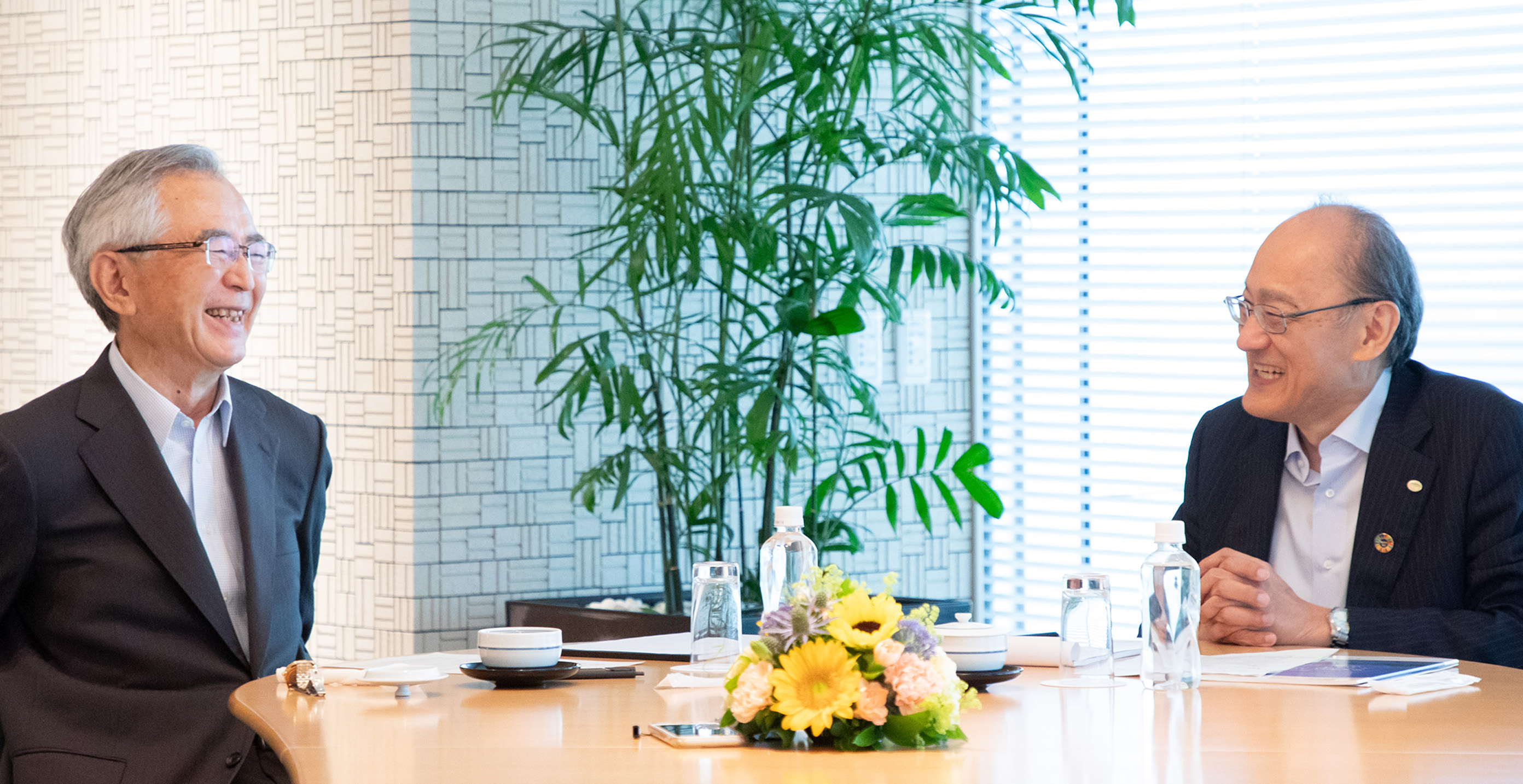
Kawamura:Hitachi's market capitalization ranks 15th to 18th among Japanese companies and around 300th in the world (as of June 2023). As such, there is still room for growth. To become a globally influential company in this era, Hitachi should increase its market capitalization by 2 trillion yen from the current 8 trillion yen to 10 trillion yen.
Speaking of Hitachi’s market capitalization, it was once 4 trillion yen before I became Chairman and President of Hitachi, Ltd. However, it had fallen to 0.8 trillion yen when I just took over. In other words, its value had plummeted by 80%, so my motivation then was to first somehow restore the company to its original value.
However, the situation is different for Hitachi today. Although it may not be easy because it is already at the 8 trillion yen, I believe it is not impossible to achieve 10 trillion yen. The thing is, even if we double that figure, we still won’t be in the world’s top 50. There are many large corporations around the world, mainly in the U.S., and Hitachi is just one of them. Recognizing this, I think it is necessary for Hitachi to further grow to be an entity that has a strong global influence.
Of course, Hitachi’s globalization itself is progressing. Currently, the Hitachi Group has about 160,000 employees in Japan, and about 210,000 employees overseas, wherein we have now more employees abroad. I think it is pursuing the right global strategy. On the other hand, we need to look at the situation in Japan. Unfortunately, I foresee that Japan’s economic strength as a whole will decline. Since the birthrate has been declining for many years, it is not possible to suddenly increase the population. As the population declines, the economy will inevitably decline. I think many people will likely not be able to bear it when standard of living will continue to become worse with each passing day. If that happens, I think someone will speak up and call on others to work harder to change the situation.
Looking back on Japan’s history, we see this kind of awakening happen twice: during the Meiji Restoration and after World War II. During the Meiji Restoration, Japan stood against the rule of Western powers, and after World War II, it rebuilt itself from the ashes of defeat. I believe that in the future, under the conditions that will prompt us to do something about our situation, there will be people who will stand tall and face the challenge, so we will surely be able to overcome. Rather, it has to happen.
And education is crucial for that end. In particular, I think it is extremely important to educate students on the history of Japan, how it overcame difficulties from the Meiji Restoration to the modern and contemporary times, and to nurture human resources who can move forward no matter what the situation may be. Not only children, but also adults and parents who teach the children must learn. I think adult education and re-learning are also very important.
People are easily ruined once they slack off. The company, too, will go out of business. In fact, I experienced this at Hitachi. As I mentioned above, in the 18 years between 1990 and 2008, Hitachi lost 80 percent of its value. We have slacked off for nearly 20 years. Of course, I was one of the lazy employees; but this should never happen again. Japan is currently in the verge of falling into the same predicament as Hitachi at that time. It is, therefore, crucial to focus on education and regain the ability of Japanese people to work hard and overcome.
Suzuki:I agree that it is important for Hitachi to become a true global leader by aiming to achieve a market capitalization of 10 trillion yen and then 20 trillion yen, and to that end, education and human resource development are a must.
Suzuki:As you mentioned earlier, the ratio of overseas employees at Hitachi is now almost 60%, wherein it has already surpassed the number of employees in Japan, pointing to the increasing need for pursuing diversity and equality. Under such circumstances, what do you think companies and society must do in order to nurture global leaders who will lead the organization to growth by cooperating with people with diverse backgrounds?
Kawamura:Japan is an island country, so even if its economic power declines, I don’t think you can feel it when you are in Japan. Therefore, it is very crucial to be aware of and maintain our relationship with foreign countries. Hitachi, which has a large number of non-Japanese employees, can set a good example in this area.
As globalization progresses, the location of headquarter functions has become an increasingly important issue for global companies, including Hitachi. In Hitachi’s case, its having created leading use cases abroad is a very good move in the switch to a business for providing new values through the use of data centering on Lumada. Particularly, in 2021, the addition of GlobalLogic, a leader in design-driven digital engineering, to the Hitachi Group has accelerated the global expansion of Lumada.
In light of these developments, I think it must reexamine whether it is best to have the head office functions located in Japan (Tokyo). North America and Europe may become the center of business in the future. Southeast Asian countries, India, Bangladesh, and other emerging countries will also see rapid growth. With the need to carry out business in cooperation with these and other countries around the world, the ideal structure to have is an “autonomous and decentralized global company”. To do so, it should consider where it should place the core of management and decision-making. Although this is something that the core of the management needs to think about, I would like HRI to also think about how the head office functions of an autonomous and decentralized global company should be implemented.
Suzuki:Whether to be in Japan or overseas is an important question not only for the location of head office functions, but also for the assignment of leaders. As someone who had served as president and chairman of the company, what kind of human resources do you think are best suited as global leaders?
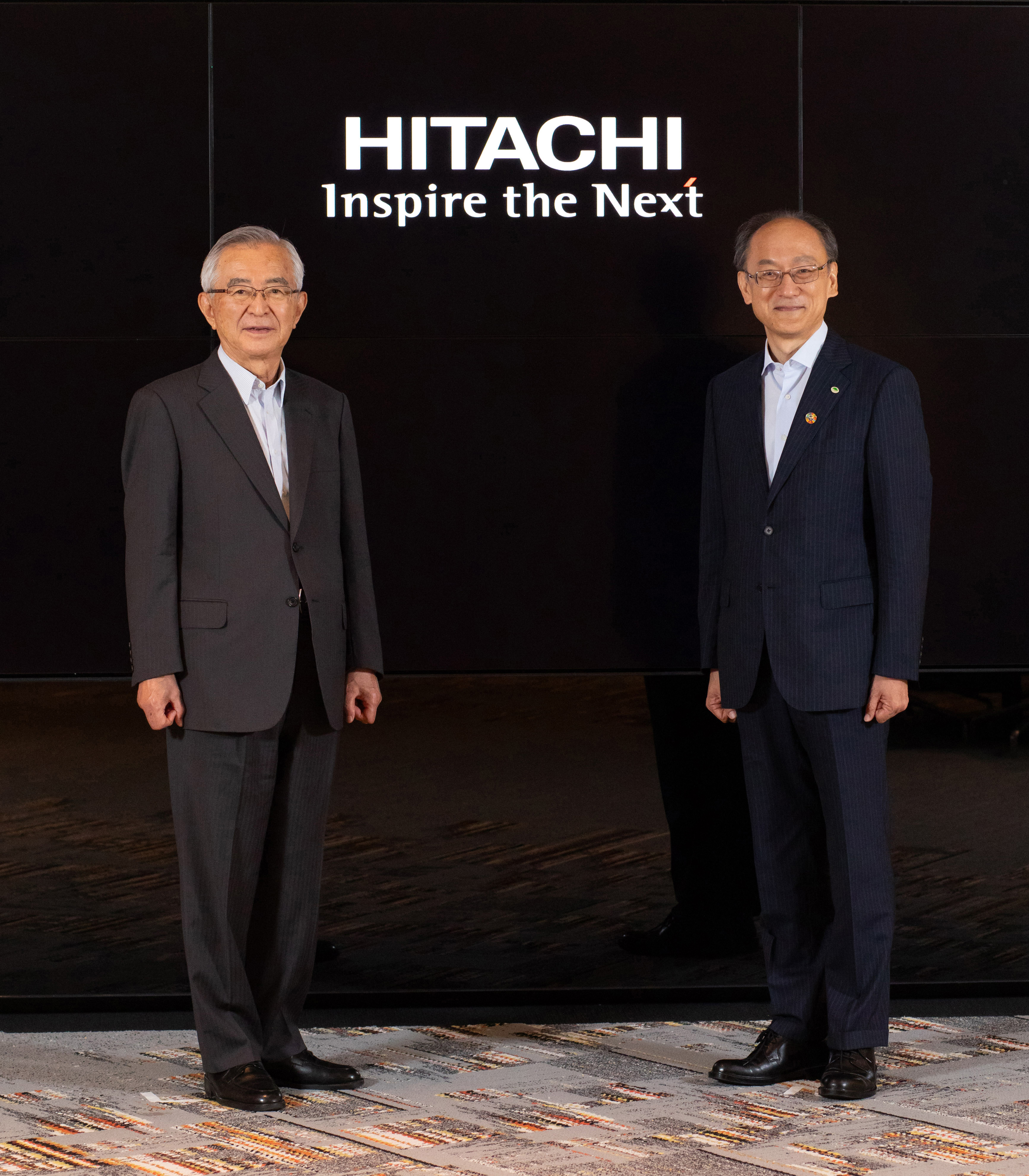
Kawamura:I think talents with a long-term and global perspective are suitable as global leaders. In the case of Hitachi, they should be talents who are able to deploy business overseas while maintaining a good understanding of Japanese customs and business practices. In particular, overseas personnel are usually very zealous about reskilling. Some people negotiated and secured their salary for two years by saying “If you send me to an overseas company for two years, I will study these things and come back.” Of course, it is also very important for Japanese to gain experience overseas. When I was at the helm in 2009, employees who had worked overseas came back to Tokyo and engaged in reforms, which helped a lot. Indeed, overseas business experience fosters leaders and also nurtures the people who support them, so we need to consciously enable employees to gain such experience.
Also, since Japanese are good at carrying things out carefully and meticulously, it may be better to leave the business to the Japanese once it gets on track. On the other hand, non-Japanese may be better at handling things until the project has been finalized and ready to run. As you experience various ways of doing things, you will be able to visualize the best approach.
In any case, what I want to say especially to young employee is to study English hard. If you say that AI can do the English instead of you so you don’t have to study, you will be left far behind by other people in Southeast Asia who are studying with English textbooks. After all, English is essential in the business scene.
Suzuki:Lastly, I would like to ask about your expectations for HRI and your advice to young researchers. You come from a science background, but please tell us how you have acquired a wide range of education that goes beyond the boundaries of humanities and sciences, and how you have leveraged it in your work.
Kawamura:I feel embarrassed when I am told that I am broadly educated. But I do like reading a lot. When I was in junior high school, I borrowed books and read them until late at night, so my mother often scolded me. I was not reading difficult books back then, but only light reading materials such as the Adventures of Tom Sawyer. As I got a little older, I started reading many books by Ryotaro Shiba, Leo Tolstoy, Fyodor Dostoevsky, and other serious authors.
Of course, I also read research papers and journal articles after entering university and after joining the company. I think it is very important to learn by going beyond the conventional boundaries of the humanities and sciences. People in the humanities should be interested in the technology trends, while people in the sciences should understand the impact of what they are doing on society. Indeed, both the issues of inequality and carbon neutrality are the results of pushing forward with technology alone without looking at the world around.
Therefore, I would like HRI to make recommendations that have a great impact on the world while having a firm grasp of both the humanities and sciences. For example, as I mentioned at the beginning, one of the important themes that HRI should work on is how to eliminate disparities while maintaining the animal spirit of capitalism. I think it will also be interesting to study the future of computers and humans and see how far computers and AI will evolve and what sort of things only humans can do. I hope that people in the humanities and sciences will work together in this way to create a concrete vision for the future.
Suzuki:Indeed, HRI should work on making recommendations and future projections that will lead the world to a better direction through such collaborations. Thank you very much for your time today.
*Google is a trademark or registered trademark of Google LLC.
*Amazon is a trademark of Amazon.com, Inc. or its affiliates.
*Facebook is a registered trademark of Meta Platforms, Inc.
*Apple is a trademark of Apple Inc., registered in the U.S. and other countries.
*Microsoft is a trademark of the Microsoft group of companies.
*Other company and product names mentioned in this publication are trademarks or registered trademarks of their respective companies.
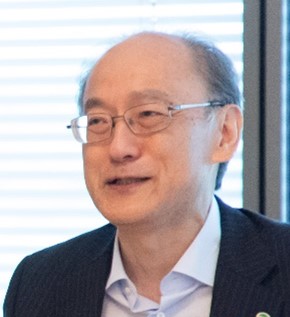
We invited Chairman Emeritus Takashi Kawamura, who had been in charge of Hitachi's management for many years as “The Last Man” (final decision maker), to talk about the role that HRI should play going forward. In the midst of the drastic shift toward a digital society, he advised us to analyze and discern risks based on a firm grasp of the changes in the industrial structure, to address essential social issues, such as the correction of disparities, and to make recommendations that contribute to shaping the directions of the transformation of the Hitachi Group’s business portfolio. We will endeavor to delve into the essence of digital transformation with the “determination and resolve” of having overcome the difficulties of the Meiji Restoration and after World War II.
Norihiro Suzuki, Chairman, Hitachi Research Institute